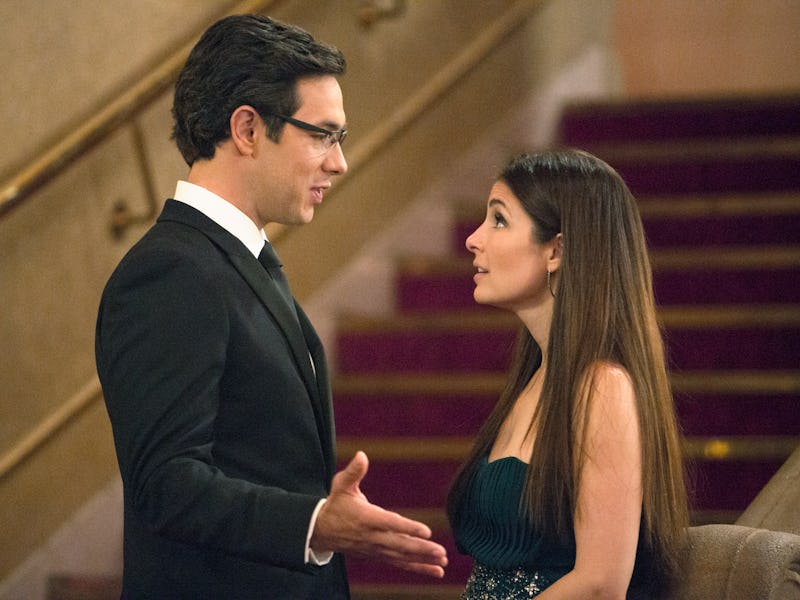'UnREAL' Has No Heroes; So Why Can't We Stop Rooting for the Characters?
In Season 2, the lack of good intentions on this show is being pushed in our face more than ever before.

If you’ve gotten this far on UnREAL, it’s probably not because you “like” the characters. Yet somehow, the show plays with our sympathies – and we find ourselves rooting for different prickly personalities at various times. The universe of Lifetime’s breakout hit destabilizes objective notions of baseline morality, or Doing the Right Thing, entirely; it does so with unbelievable skill. In the claustrophobic, fundamentally poisonous universe of the Everlasting… set, choices are motivated by the need to survive; characters struggle to counteract various oppressive (usually patriarchal) forces, and by score small, ephemeral victories (Jay’s desire to make Ruby the “wifey,” Quinn’s desire to sabotage Coleman’s reign, and so on).
The viewer’s sense of who is doing the better terrible thing has never been as blurred or subjective as in the past two episodes of the series. And last night’s convoluted power struggle was the most confounding.
On some level, Coleman (Michael Rady) and Rachel’s (Shiri Appleby) desire to overturn the time-tested, life-ruining machinations of Quinn’s (Constance Zimmer) regime on Everlasting… seem vaguely noble. Yet with Coleman’s truculent decrees of the new era of attention-grabbing, think piece-ready TV he is ushering in, one can’t help feel that his motivations are less than ingenuous. Quinn warns Rachel that Coleman is “a Chet,” or rather “a user, and one can’t help feel that, as usual, Quinn is correct on this one, though we haven’t quite seen the tip of the iceberg. The sports car he accepted undeservingly from Gary (Christopher Cousins), and his declarations of professional war, make it clear that Coleman is not the dream partner for Rachel, as she surprisingly declares to Quinn.
In fact, if there’s anything we learn in this episode, it’s that most people have something awful in them, or something weak forces them into disastrous mistakes. In the former case, it’s Josh Kelly’s Jeremy, who w’ve seen spiraling into alcoholism throughout the season. Now, it leads him to toward the point of being physically abusive — with the woman he claims to love. In that moment, it’s clear that his love is more based in a feeling of “deserving her, as much as caring for her well-being.
The perplexing counterpoint, however, is that Chet (Craig Bierko) swoops in to pull Jeremy off Rachel, which feels in the moment disturbing. It also seems unlikely, but of course, it’s meant to. Chet plays the savior, but one can’t help but feel that though he has a more solid moral fiber than Jeremy in this instance, any alliance he might strike up with Rachel could only be conditional. Can Chet ever, really, truly change? It’s been a theme since the show’s pilot, and with this moment, and his seemingly sincere, recent overtures to Quinn, were led toward wondering if some sort of meaningful conversion could truly happen.
Jeremy the Awful
Then again, he’s just been sprung from jail after stealing his baby from his estranged ex-wife. Will anyone trust him every again?
The one seemingly good thing on the show was Darius’ (B.J. Britt) budding romance with Ruby (Denee Benton). But both Darius’ self-doubt, a few overzealous words from Ruby, and, obviously, Quinn’s dastardly, legally questionable plan to sabotage them seemed to have derailed that for good.
One can’t help wondering, after last night’s episode, doubting whether this show will ever accommodate any happily-ever-afters, even of the most modest, compromised sort. As always, it seems human frailty overpowers all; after all, its what Everlasting and “reality TV” is built on. In the petri dish that is Quinn and Rachel’s “closed” set, there’s nowhere to push away dark feelings. Everything is work,” as Quinn put it in Episode 4, and the nature of the “work,” of course, usually falls somewhere between reprehensible and outright evil.
Darius breaks Ruby's heart
What is amazing is how much sympathy we manage to feel, at some point, for nearly every character in this show, while becoming acclimated to distrust characters who seem well-meaning enough, like Coleman or even Darius. Both of these men seem so hellbent on preserving their success that they are willing to concede to almost anything, though they haven’t yet made any outright missteps.
So we wait around for them to break bad become “Chet”s, as Quinn would say — while continuing to feel strangely emotionally invested in this eternally hopeless show. Characters are consistently being forced to work against their own emotion, or channel them into vengeance or remorseless power-plays. Yet against all our better judgment, we hope for them against hope, perhaps because we see the darker parts of them in ourselves. The power of UnREAL continues to be unlike anything else on television.